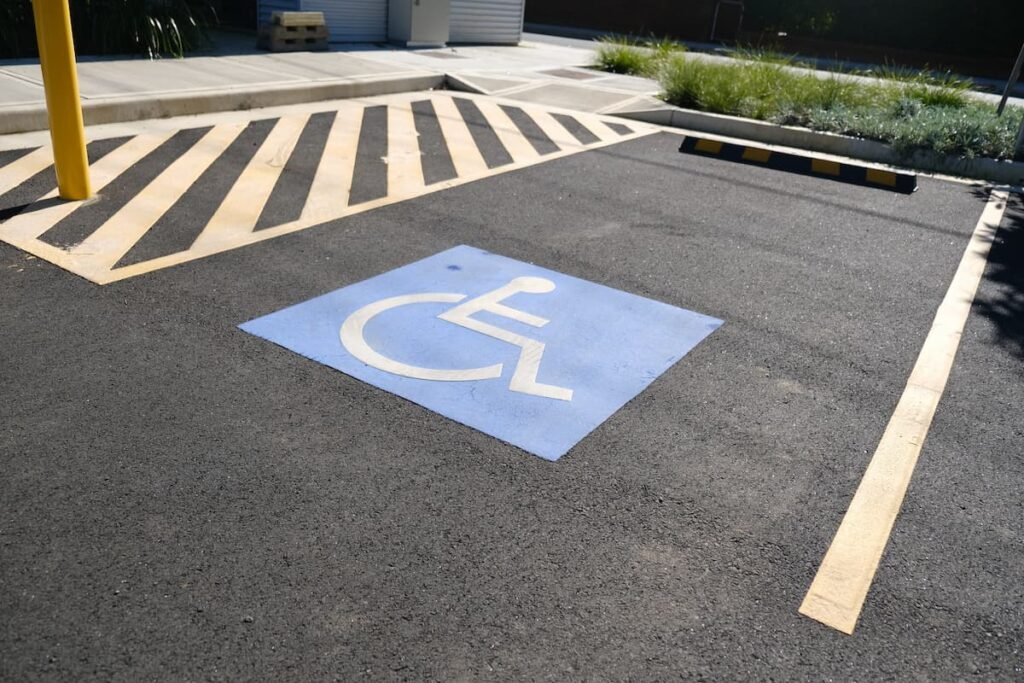Handicap parking permits play a crucial role in providing accessible parking options for individuals with disabilities. These permits are designed to ensure that people with mobility challenges can park closer to their destinations, making it easier for them to navigate everyday tasks and activities. The availability of these permits helps enhance the quality of life for those who need them and supports their independence. In this blog post, we will explore the essentials of handicap parking permits, including eligibility criteria, application processes, and usage guidelines. Understanding these aspects can help individuals make informed decisions and ensure they are using their permits correctly.
What is a Handicap Parking Permit?
A handicap parking permit is an official document or placard that allows individuals with disabilities to park in designated spaces reserved for them. These spaces are typically located closer to building entrances or other key locations to facilitate easier access. The purpose of the permit is to provide greater mobility and convenience to individuals who have difficulty walking long distances or who require special accommodations. By displaying this permit, individuals signal their need for these specially designated parking spots, which are often marked with the universal wheelchair symbol. This system helps ensure that accessible parking spaces are available for those who genuinely need them.
Definition and Purpose
The handicap parking permit is a practical tool that offers essential support for people with physical disabilities. It is issued by local or state authorities and comes in various forms, including placards that hang from the rearview mirror or special license plates. The primary purpose of these permits is to provide convenient and accessible parking solutions, reducing the distance that individuals with mobility issues need to travel. This, in turn, helps them participate more fully in daily activities, whether it’s shopping, visiting healthcare providers, or attending social events. The permit also plays a significant role in promoting inclusivity by ensuring that people with disabilities have equal access to public and private facilities.
How it Benefits Individuals with Disabilities
Handicap parking permits offer several benefits that significantly impact the lives of individuals with disabilities. Firstly, they provide access to parking spaces that are closer to building entrances, reducing the amount of walking required. This is especially important for people with conditions that cause pain, fatigue, or limited mobility. Secondly, having a permit helps ensure that individuals with disabilities are not forced to park far away from their destinations, which can be both inconvenient and physically taxing. Additionally, these permits often come with legal protections, ensuring that designated parking spots are reserved for those who need them, thereby preventing misuse by others.
Who is Eligible for a Handicap Parking Permit?
Eligibility for a handicap parking permit is generally based on specific criteria that are determined by local or state regulations. To qualify for a permit, individuals usually need to demonstrate that they have a medical condition that severely limits their ability to walk. This can include a range of disabilities, from mobility impairments and chronic health conditions to severe vision impairments. The application process often requires medical documentation to verify the individual’s condition and the impact it has on their mobility. Understanding these criteria helps ensure that permits are issued to those who truly need them, maintaining the integrity and availability of accessible parking spaces.
Criteria for Eligibility
The criteria for obtaining a handicap parking permit typically involve proving that a medical condition significantly impairs one’s ability to walk. This includes conditions such as severe arthritis, neurological disorders, or other physical impairments that affect mobility. Each jurisdiction may have slightly different requirements, but the common factor is that the condition must substantially limit a person’s ability to move around without assistance. In many cases, a healthcare provider must complete a certification form or provide a statement detailing the individual’s condition and how it affects their mobility. This helps authorities assess the applicant’s need for a permit and ensures that it is issued to those who genuinely require it.
Common Conditions and Disabilities that Qualify
Common conditions that may qualify an individual for a handicap parking permit include severe arthritis, amputations, muscular dystrophy, chronic respiratory conditions, and certain cardiovascular diseases. Additionally, conditions like multiple sclerosis or Parkinson’s disease, which affect motor control and coordination, may also qualify. Vision impairments that severely impact the ability to navigate safely can be another factor. Each condition is assessed on a case-by-case basis, with the emphasis on how significantly the disability affects the person’s ability to walk or use standard parking spaces. Medical evaluations and documentation play a crucial role in determining eligibility and ensuring that the permit is granted appropriately.
How to Apply for a Handicap Parking Permit
Applying for a handicap parking permit involves several steps, including filling out an application form, obtaining medical certification, and submitting the necessary documents to the relevant authorities. The application process can vary depending on the state or local jurisdiction, but generally, it involves visiting a government office or website to obtain the application form. Applicants must then have their healthcare provider complete a medical certification to verify their disability. Once the form is completed, it must be submitted along with any required identification and proof of residency. After submission, the permit is usually issued within a few weeks, depending on processing times.
Steps to Apply
To apply for a handicap parking permit, start by obtaining the application form from your local Department of Motor Vehicles (DMV) or equivalent authority. The form can often be found online or picked up in person. Next, have your healthcare provider complete the medical certification section, which details your disability and its impact on your mobility. After completing the form and gathering any additional required documents, such as proof of identity and residency, submit your application to the appropriate office. Some jurisdictions may offer online submission options, while others may require in-person submission. Once processed, you will receive your permit, which should be displayed according to local regulations.
Required Documentation
When applying for a handicap parking permit, certain documents are typically required to support your application. These often include a completed application form, a medical certification form from a licensed healthcare provider, and proof of identification, such as a driver’s license or state ID. Proof of residency may also be required to confirm that you live in the area where you are applying for the permit. Some jurisdictions might also ask for additional documentation, such as a recent utility bill or lease agreement. Ensuring that you have all the necessary paperwork prepared and submitted will help streamline the application process and avoid delays.
Where to Submit the Application
The location where you submit your Handicap Parking Permit application depends on your local or state regulations. Generally, applications can be submitted to your local Department of Motor Vehicles (DMV) office or a similar government agency responsible for issuing permits. In some areas, you may be able to submit your application online through the DMV or local government website. Additionally, some jurisdictions allow applications to be mailed in, although this may take longer for processing. It is essential to check with your local authorities to determine the correct submission method and any specific procedures that need to be followed.
Types of Handicap Parking Permits
Handicap parking permits come in various types, each designed to meet different needs and situations. The two primary categories are temporary and permanent permits. Temporary permits are typically issued for short-term conditions or recovery periods, such as after surgery or an injury. These permits are usually valid for a limited time and can be renewed if necessary. Permanent permits, on the other hand, are issued to individuals with long-term or permanent disabilities. They do not need frequent renewal and are intended for ongoing use. Understanding the differences between these types helps individuals choose the appropriate permit for their situation.
Different Types
Handicap parking permits are categorized mainly into two types: temporary and permanent. Temporary permits are for individuals with conditions that are expected to improve or resolve within a specific period. These permits are often issued for conditions like recent injuries or surgeries that temporarily affect mobility. They are usually valid for a few months and can be renewed if needed. Permanent permits, in contrast, are for individuals with long-term or permanent disabilities that significantly impact their ability to walk. These permits typically do not require frequent renewal and are intended for continuous use. Both types of permits provide access to the same designated parking spaces but are tailored to the duration of the individual’s disability.
Differences in Usage and Benefits
The main difference between temporary and permanent handicap parking permits lies in their usage duration and renewal requirements. Temporary permits are useful for individuals who expect their condition to improve, providing them with necessary parking access during their recovery period. They are designed to be short-term solutions and must be renewed periodically based on the individual’s medical situation. Permanent permits, on the other hand, are issued to those with long-term disabilities and offer ongoing access to designated parking spaces. They provide stability and long-term convenience without the need for frequent renewals. Both types of permits help improve accessibility and ease of mobility, but they cater to different needs and durations.
Rules and Regulations for Using a Handicap Parking Permit
Using a handicap parking permit comes with specific rules and regulations that must be followed to ensure compliance and avoid penalties. The permit must be displayed correctly in the vehicle, typically hanging from the rearview mirror or affixed to the license plate, as per local regulations. It is illegal to use a handicap parking permit unless the person with the disability is in the vehicle. Misuse of the permit, such as using it when the permit holder is not present, can result in fines or other legal consequences. Understanding these rules helps ensure that the permit is used appropriately and that accessible parking spaces remain available for those who need them.
Legal Requirements for Displaying the Permit
To comply with legal requirements, a handicap parking permit must be displayed properly in the vehicle. Most jurisdictions require the permit to hang from the rearview mirror when the vehicle is parked. Alternatively, some areas may allow the permit to be displayed on the dashboard or affixed to the license plate, depending on local regulations. It is important to follow these guidelines to avoid fines and ensure that the permit is visible to parking enforcement officers. Additionally, the permit must be displayed whenever the vehicle is parked in a designated handicap parking space, whether the permit holder is present or not. Ensuring correct display helps maintain accessibility and proper usage of these parking spaces.
Common Violations and Penalties
Common violations related to handicap parking permits include using the permit without the permit holder being present, parking in designated spaces without a valid permit, and allowing others to use your permit improperly. Penalties for these violations can vary by jurisdiction but typically include fines and, in some cases, vehicle impoundment. Misuse of a handicap parking permit not only leads to legal consequences but also reduces the availability of accessible parking spaces for those who genuinely need them. To avoid penalties, it is essential to understand and adhere to the regulations governing permit use, ensuring that permits are used only for their intended purpose and in accordance with the law.
Renewing and Updating Your Handicap Parking Permit
Handicap parking permits must be renewed periodically to ensure they remain valid and up-to-date. The renewal process generally involves submitting a renewal application, which may include updated medical documentation if your condition has changed. The frequency of renewal can vary depending on whether you have a temporary or permanent permit. For temporary permits, renewal may be required more frequently, while permanent permits typically have longer validity periods. Additionally, if there are any changes to your personal information or medical condition, it is important to update your permit accordingly to maintain its validity and accuracy.
How and When to Renew
Renewing a handicap parking permit involves submitting a renewal application to the relevant authority, such as the DMV or local government office. The renewal process usually requires completing a form and providing any updated medical information if your condition has changed. For temporary permits, renewal may be required every few months or as specified by your local regulations. For permanent permits, the renewal period is typically longer, such as every few years. It is important to check the expiration date on your permit and start the renewal process before it expires to avoid any lapses in validity. Keeping track of renewal deadlines helps ensure that you continue to have access to designated parking spaces.
Updating Information on Your Permit
If there are any changes to your personal information or medical condition, it is crucial to update your handicap parking permit to reflect these changes. This might include changes in your address, vehicle information, or updates to your medical condition that affect your eligibility. To update your permit, you will need to contact the issuing authority and submit the necessary documentation, such as proof of the new address or updated medical forms. Keeping your permit information current ensures that it remains valid and that you comply with local regulations. Regularly reviewing and updating your permit helps avoid any issues with permit usage and maintains the integrity of the parking system.
Benefits of Having a Handicap Parking Permit
Having a handicap parking permit offers several significant benefits, primarily related to accessibility and convenience. The most obvious benefit is the access to designated parking spaces that are typically located closer to building entrances, reducing the distance individuals with disabilities need to walk. This can make everyday tasks like shopping, visiting healthcare providers, or attending events much easier. Additionally, having a permit can reduce the stress and difficulty of finding suitable parking, which is especially important for those with mobility challenges. Overall, the permit helps enhance independence and improves the quality of life by providing easier access to essential services and activities.
Access to Designated Parking Spaces
One of the primary benefits of having a handicap parking permit is the access to designated parking spaces. These spaces are strategically located close to building entrances and other key areas, making it easier for individuals with disabilities to reach their destinations. By parking in these reserved spots, permit holders can avoid long walks and potential obstacles that might be encountered in regular parking areas. This not only provides physical convenience but also helps reduce the strain and fatigue associated with walking long distances. Ensuring that these spaces are used by those who genuinely need them helps maintain their availability and supports the overall accessibility of public and private facilities.
Enhanced Mobility and Convenience
A handicap parking permit significantly enhances mobility and convenience for individuals with disabilities. By providing access to closer parking spaces, the permit helps reduce the physical effort required to reach various destinations. This is particularly beneficial for people who experience pain, fatigue, or limited mobility due to their condition. The convenience of having designated parking spaces also helps reduce the time and stress involved in finding suitable parking. This improved accessibility allows individuals to participate more fully in daily activities, such as running errands, attending appointments, and enjoying social events, ultimately contributing to a better quality of life.
Challenges and Common Questions
Despite the benefits, using a handicap parking permit can sometimes come with challenges and common questions. These might include concerns about permit misuse, issues with parking enforcement, or uncertainties about eligibility and rules. Addressing these challenges involves understanding the regulations and being aware of the rights and responsibilities associated with having a permit. It is important to stay informed about the rules to ensure proper use and to handle any issues with parking enforcement effectively. By addressing common questions and concerns, individuals can better navigate the system and ensure they are using their permit in compliance with local regulations.
Addressing Common Concerns and Misconceptions
Common concerns and misconceptions about handicap parking permits often revolve around issues of misuse and eligibility. Some people may worry about others abusing the system by using permits improperly or question whether certain conditions qualify for a permit. It is essential to understand that handicap parking permits are regulated by local laws and are issued based on specific medical criteria. Misuse of permits, such as using them when the permit holder is not present, is illegal and can lead to penalties. Educating oneself about the proper use of permits and addressing these misconceptions helps ensure that the system remains fair and accessible for those who truly need it.
Tips for Handling Issues with Parking Enforcement
If you encounter issues with parking enforcement related to your handicap parking permit, it is important to handle them calmly and efficiently. Start by ensuring that your permit is displayed correctly and that all information is up-to-date. If you receive a citation or face enforcement issues, review the citation carefully and understand the reason for the violation. Contact the issuing authority or parking enforcement office to discuss the issue and provide any necessary documentation to resolve it. Keeping accurate records of your permit and any communications with authorities can help address disputes and ensure that your rights are protected. Being proactive and informed can help resolve issues effectively and maintain compliance with regulations.
Conclusion
In summary, handicap parking permits are a vital resource for individuals with disabilities, providing essential support and improving accessibility. Understanding what these permits are, who is eligible, and how to apply can help individuals make the most of this benefit. By following the rules and regulations, renewing permits as needed, and addressing any challenges that arise, permit holders can ensure that they use their permits effectively and fairly. Handicap parking permits play a significant role in enhancing mobility and convenience, supporting independence, and promoting inclusivity. If you are eligible, applying for and properly using a handicap parking permit can make a meaningful difference in your daily life.











